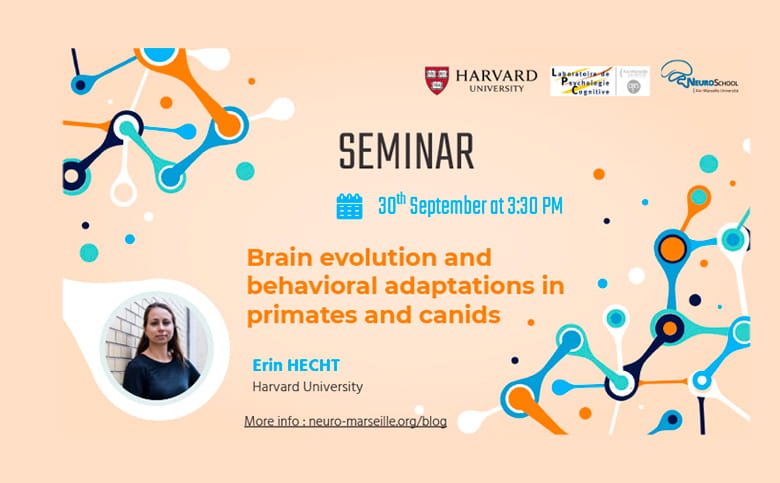Description de la soumission d'un avis

Brain evolution and behavioral adaptations in primates and canids
by Erin HECHT, Harvard University
Brain evolution and behavioral adaptations in primates and canids by Erin HECHT
For the next NeuroSchool seminar, in collaboration with the Cognitive Psychology Laboratory , we are pleased to welcome Erin Hecht, who works at Harvard University, Boston (USA). She will present her research on brain evolution and behavioral adaptations in primates and canids. The seminar will take place on September, 30th 2021, at 3:30 PM (UTC+2), via Zoom.
🗓 September 30, 2021, at 3:30 PM (UTC+2)
🕓 1-hour meeting
📌 Attention, PhD Program students, please register via this form on Ametice.
Registration to receive the connection link is at the end of this page.
Register and receive the zoom link
Abstract
Erin Hecht’s lab studies brain evolution. Her research compares human brains to our closest primate relatives (chimpanzees) in order to understand what makes us unique.
Another area of research looks at different breeds of dogs as a natural experiment on how brains evolved new behaviors. For example, Erin Hecht tries to understand what makes Border Collie brains good at herding and Beagle brains good at following a scent.
She also studies experimentally domesticated foxes, which are a model of how wolves evolved into dogs and also to understand how humans became more socially tolerant in our own evolutionary history (“self domestication”).
Perhaps the most important adaptation in a human brain is that it’s wired in a way that allows us to watch what someone else is doing, reproduce that behavior, and then make incremental improvements on it. This is what’s called cumulative culture. And it’s what allowed us to go from making stone tool technology to spacecraft technology in an evolutionary eye blink, just a few thousand years. And for comparison, chimpanzee technology has remained basically frozen during that same time period. The evolutionary implications of this are profound. It means that we can inherit patterns of perception, cognition, and behavior not just through biological evolution like other animals, through our genes, but also through cultural transmission of words and ideas.

Dr. Hecht received her B.S. in Cognitive Science from the University of California San Diego in 2006, and her Ph.D. in Neuroscience from Emory University in 2013. Before moving to Harvard, she was a Research Scientist in the Center for Behavioral Neuroscience at Georgia State University, and Affiliated Scientist at the Yerkes National Primate Research Center at Emory University.Dr. Hecht joined the Department of Human Evolutionary Biology at Harvard University in January 2019. Her lab studies brain-behavior evolution in dogs, primates, and humans. She has two Miniature Australian Shepherds, Lefty and Izzy, who are mostly good.

